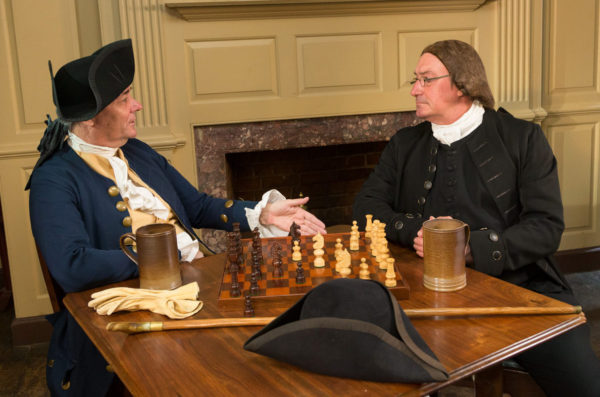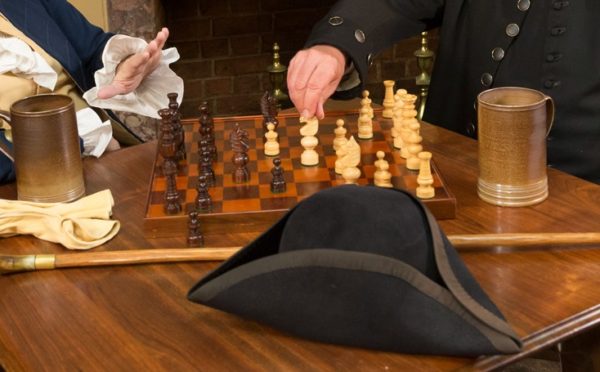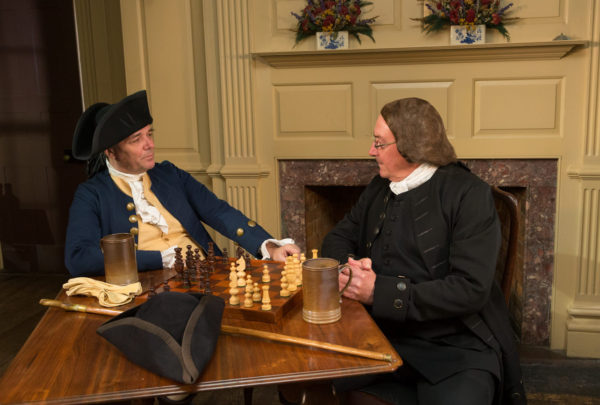
Most Americans (I suppose, perhaps too optimistically) can identify, “Give me liberty or give me death!” as the words of Patrick Henry. Leaving aside the question of whether those were his precise words delivered during the Second Virginia Convention in 1775, how many Americans know what Mr. Henry did after the Revolution?
The answer is necessary background to this fanciful conversation between Henry and George Washington in King’s Arms Tavern, in which they discuss holding political office in the context of duty and patriotism.
Serving in the First Continental Congress, Patrick Henry certainly seemed like a nationalist when he stood and declared, “The distinctions between Virginians, Pennsylvanians, New Yorkers, and New Englanders are no more. I am not a Virginian, but an American.”
The truth proved to be more complicated. Henry largely departed the national stage when he resigned from Congress in 1775 to take up his short-lived position heading Virginia’s military forces.
But Henry didn’t exactly descend into obscurity; far from it. He was Virginia’s first governor after independence, serving a total of five terms. He continued to serve in the House of Burgesses. In 1787 he declined an invitation to attend the Constitutional Convention in Philadelphia, famously explaining, “I smelt a rat.”
He was a powerful dissenting voice during the ratification of the Constitution, arguing vehemently against the consolidation of power in a centralized government and for the protection of individual rights. That, of course, was a battle he lost. But he made his peace the new charter, and while he continued to harbor reservations, he was a constant public servant.

After retiring for good from government in 1791, he retreated to his home and family. One might say his return home bore some resemblance to a certain general’s retirement to Mount Vernon after the war.
George Washington gave in to the call to return as president. In 1795, Washington began urging Henry to heed the call to return to public service. In quick succession Henry declined appointments to the U.S. Senate, ambassador to Spain, and secretary of state.
Decades after he first rose to prominence, Patrick Henry was still valued—and the reasons were partly political. In the mid-1790s, America’s first substantial opposition party, the Democratic Republicans, was gaining adherents. Led by Thomas Jefferson and James Madison, they proposed an alternative direction to the course being charted by the Federalists.
Both parties had much to gain by having Patrick Henry in their fold. Thomas Jefferson, for one, expressed doubt about the sincerity of the job offers coming Henry’s way, opining to James Monroe that “He has been offered every thing which they knew he would not accept.”

Indeed, Henry turned down every single offer. He was even approached about an appointment to be chief justice of the Supreme Court. But Henry refused every offer. His own health, as well as that of his family, weighed on him. He chose to retire and, unlike Washington, the American Cincinnatus, he stuck to it.
So, in this age of disgust with career politicians, how do we weigh Patrick Henry’s choice. Is it admirable to turn down George Washington himself? Did he sacrifice another level of fame for his suspicion of the Constitution? These are interesting questions, because if “we the people” are truly in charge, then do we have room for demi-gods?
We rightly revere dedication to honor and duty. Patrick Henry’s stand at very least gives us another way to think about what those words mean in a republic.



Interesting that GW wore his hat indoors. Was that untypical in the time?
Hey Bill,
Nice post on George Washington and Patrick Henry. Strange to thing we’re gonna have a new president soon!
Dennis
The genesis of the Civil War - individual liberty and states rights balanced against a centralized government. Mr. Henry’s stance was principled, and I would submit that as a Christian he listened more to the direction from the Holy Spirit than the directions from Washington or any other politician. I don’t think that in principle he could be a part of the government he had such reservations about, but I think he did continue to work for the good of the people.
Mr. Washington seems to be demanding primary allegiance to the centralized government, and seems to regard service at that level as the only true public service; Mr. Henry believed that his primary allegiance was to Virginia. George Mason also stayed at state level. The concept of primary allegiance being to one’s home is the belief that caused Robert E. Lee to go to the service of his native state and home instead of supporting what many regarded as the tyranny of a centralized government.
Virginia did not just jump on some bandwagon of hysteria for secession. In fact, Virginia was in no hurry to secede. Virginia had formed a Secession Convention, but one of the convention’s first actions was to create a 21-member Federal Relations Committee which was charged with reaching a compromise to the sectional differences in the US as they affected Virginia. The committee was made up of 4 secessionists, 10 moderates and 7 unionists. However, five days after the Succession Convention was approved, the Virginia General Assembly also called for a national Peace Conference to be led by a former President of the United States and a Virginian, John Tyler, to be held in Washington D.C. on February 4, 1860. (That was the same date that elections were scheduled for delegates to the secession convention.) The firing on Ft. Sumter scuttled that effort.
Why was Ft Sumter fired on? South Carolina had seceded, and demanded the surrender of Ft. Sumter in keeping with its determination that the fort was unlawfully occupied by Union troops in a sovereign state. Southern Unionists had been assured by US Sec of State Seward that Ft Sumter WOULD BE ABANDONED; instead, attempts were made to resupply. The federal government was talking out of both sides of its mouth. Still, at this point, Virginia had made no determination to secede. After Ft Sumter was fired on, Lincoln (thru Sec of War Cameron) called on the states, including Virginia and other southern states that had not seceded, to detach troops from their own state militias “to execute the laws of the Union, suppress insurrections, repel invasions, etc.” Virginia’s Gov Letcher’s response swayed Virginia public opinion toward secession: “Executive Department, Richmond, Va., April 15, 1861. Hon. Simon Cameron, Secretary of War: Sir: I have received your telegram of the 15th, the genuineness of which I doubted. Since that time I have received your communications mailed the same day, in which I am requested to detach from the militia of the State of Virginia “the quota assigned in a table,” which you append, “to serve as infantry or rifleman for the period of three months, unless sooner discharged.” In reply to this communication, I have only to say that the militia of Virginia will not be furnished to the powers at Washington for any such use or purpose as they have in view. Your object is to subjugate the Southern States, and a requisition made upon me for such an object - an object, in my judgment, not within the purview of the Constitution or the act of 1795 - will not be complied with. You have chosen to inaugurate civil war, and, having done so, we will meet it in a spirit as determined as the administration has exhibited toward the South. — Respectfully, John Letcher”
Support for slavery and oppression is impossible to defend. Support for individual liberty and state’s rights? Weren’t those the primary reasons for fighting the American Revolution in the first place? Many southerners still call the Civil War the War of Northern Aggression. Remember that only a third of southern families owned slaves - and a few slave owners were free blacks; many southerners fought for their own personal liberty.
I love how Colonial Williamsburg’s Patrick Henry, Thomas Jefferson, etc. do not dodge the questions on slavery, but lay out the facts so that visitors can see that there were hard questions with no easy answers that dogged our nation from before it was formed. So many times, I have seen visitors just waiting to “get” the founding fathers on questions of slavery. After talking to them, most visitors come away with thoughtful expressions and the discovery that it wasn’t such a simple question after all for economic and logistical reasons. Morally, slavery and oppression have always been indefensible, and they do not dodge that fact.
One lesson here is that delay.in “doing the right thing” often causes worse problems down the road of history.
Patrick Henry and others obeyed their consciences. I think they would tell us to educate ourselves on the issues, and then listen to and obey our consciences. The US is not perfect - but it is so far above many other countries that we can’t even imagine what their lives are like. So instead of tearing our country down, lets work together to correct wrongs while upholding law, order, and justice.
God bless the United States of America!
I don’t believe it is possible to have an absolutely genuine devotion to liberty while simultaneously maintaining it is a right to own another human being as property. The two can’t both be truly and fully held by the same person.
There were slaveholders who despite the “logistics” and hardship doing so resulted in, did choose to free their slaves when no one was making them do so.
Seward thought he was going to be a de facto Prime Minister because he had a view of Lincoln as woefully not up to the task. Which with some of Lincoln’s early moves and non-moves wasn’t a surprising analysis. Seward made a number of offers and decisions thinking he could, including what he s aid regarding Ft. Sumter. He did not actually have the authority to do so. The government was not talking out of both sides of their mouth. They just had a secretary of state who was saying what he did not have the authorization of the President to say.
Maybe I am not up on all the arguments. What “state right” was threatened by the federal government other than the right to own human beings, the right to transport them wherever as property and keep them as property? Men wanted the right to eat bread wrung from the sweat of the faces of other men. Tyranny. It pretty much wipes out sympathy for the rights they insisted they had to me.
We still have tyrants “eating bread wrung from the sweat of the faces of other men.” It is economic slavery we have now in this country. And many of those who freed slaves did so in their wills after their deaths when it didn’t hurt their livelihood. Many, many with the knowledge that slavery was totally morally wrong wrestled with how on earth to do it. Just free them all and dump them out to live however they could? That’s what happened after the Civil War, and many were forced into the slavery of sharecropping and other work that paid little or nothing.
Many slaveholders had dead consciences. But don’t lump all slaveholders in that heap. Many wanted to free the slaves and wanted TIME to figure out HOW. Tell me, do you make sure your investments don’t support companies that run overseas sweatshops? Do you make sure your investments don’t support companies that rape the environment? It is very easy to point the finger at genuinely principled people who were born into a system they didn’t know how to overturn, and ignore our own moral dilemmas.
Sorry that I seem to have upset you.
I have worked for a large corporation for the past 33 years but feel its been a pretty good deal both ways. I have worked pretty hard and steadily, and they have paid me a good salary. I don’t know if I work for what you would call a bunch of tyrants.
My wife and I have six children so my only “investments” have been to their colleges. I think that has turned out okay, they are gainfully employed and stuff like that. I don’t have any investments in stock or the like. I will probably have to work until my wife gets the call to come claim my body!
Many of the slaveholding families did so for generation upon generation. I am not sure how much more time they were waiting for to figure how to end it on their own.
I keep looking periodically for a quote by Frederick Douglass I read a few years ago. It isn’t so much that it is eloquent, but it is pointed because of his own personal experiences with slavery. His point is essentially that it is irrelevant largely whether a slave owner is kinder than all others, or more moral. The mere fact that it involves one person owning another is the overarching wrong, and that is what is felt hardest by the slave.
Great piece, Bill. I’ll share it on my radio show’s FB page.
Your readers may be interested in this 2014 episode of the show, the first of three where we discussed Patrick Henry, courtesy of CW’s own Mark Couvillon:
http://ywc.podomatic.com/entry/2014-02-07T12_57_04-08_00